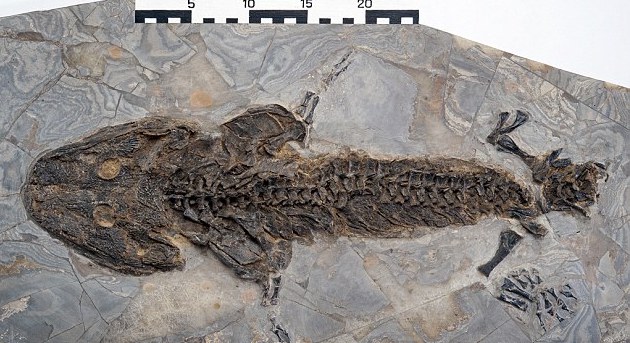The newly discovered remains of an amphibian ancestor that lived in northwest Germany 300 million years ago is the oldest evidence of limb regeneration ever found. Nadia Fröbisch, Constanze Bickelmann, and Florian Witzmann with the Museum für Naturkunde, Leibniz-Institut für Evolutions und Biodiversitätsforschung in Germany are the first to find regeneration in ancient amphibian ancestors.
The fossil remains of Micromelerpeton credneri, a distant relative of modern amphibians, shows distinct evidence of regeneration in an early ancestor of amphibians. The animal’s toes are not quite alike. The toes that are suspected of having been lost and regenerated have differences in the bone. Similar differences in bone structure and skin have been seen in modern amphibians that have lost an appendage more than once and regenerated the lost limb.
The researchers do not claim that this new specimen is the most ancient of amphibians that could regenerate limbs. The fossil is simply the oldest found to date that has definite evidence of limb regeneration. The researchers propose that limb regeneration could be much older. Some ancient fish may have developed the genetic ability to regenerate body parts before fish ever crawled onto land for the first time. The four-footed amphibians that may have evolved from the fish inherited the genetic code that produced regeneration.
No one knows exactly how salamanders and other amphibians regenerate limbs. The fact that the genetic code that produces regeneration is over 300 million years old may be a clue to finding the remnants of that genetic code in men. The idea would be to induce the latent genes to reproduce limbs that have been lost or damaged in people. The concept is predicated on finding sufficient gene code to replicate what some amphibians do naturally.















